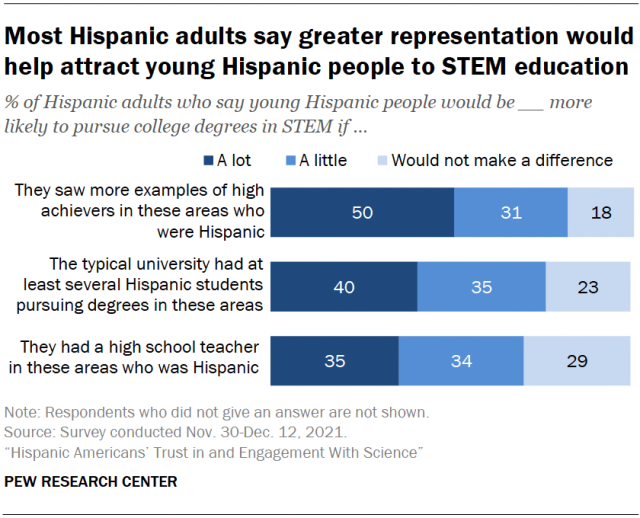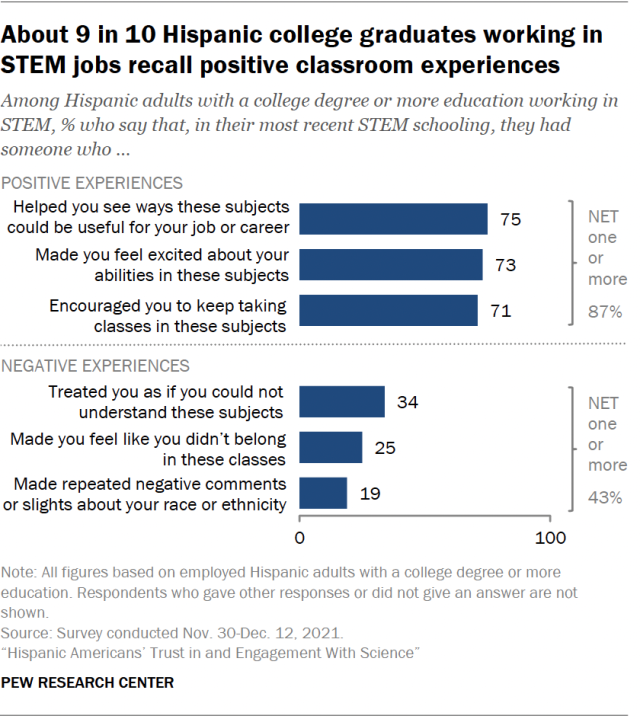
The Hispanic population of the United States has grown rapidly in recent decades, as has the number of Hispanic students who are enrolled in college. Despite this growth, Hispanic Americans remain underrepresented among workers in science, technology, engineering and math (STEM) jobs. This is the case even though demand for STEM workers is on the rise and they have higher median wages than non-STEM workers.
So what might encourage more Hispanic Americans to pursue STEM careers? We asked Hispanic Americans about this topic in a 2021 Pew Research Center survey. The survey also asked college-educated Hispanic STEM workers about positive and negative schooling experiences they may have faced on the road to their careers.
Pew Research Center conducted this analysis to highlight Hispanic Americans’ attitudes toward – and experiences with – STEM education. We surveyed U.S. adults from Nov. 30 to Dec. 12, 2021, including 3,716 Hispanic adults, including those who identify as any race. A total of 14,497 U.S. adults completed the survey.
The survey was conducted on the Center’s American Trends Panel (ATP) and included an oversample of Black and Hispanic adults from the Ipsos KnowledgePanel. Respondents on both panels are recruited through national, random sampling of residential addresses. This way nearly all U.S. adults have a chance of selection. The survey is weighted to be representative of the U.S. adult population by gender, race, ethnicity, partisan affiliation, education and other categories. Read more about the ATP’s methodology.
Here are the survey questions used for this analysis, along with responses, and its methodology.
This study was informed by a group of advisers with expertise related to Hispanic Americans’ attitudes and experiences in science, health, STEM education and other areas. Pew Research Center remains solely responsible for all aspects of the research, including any errors associated with its products and findings.
Hispanic Americans see value in increasing visibility of Hispanics in STEM

Among advocates for increased diversity in STEM fields, “representation matters” is a common refrain. Hispanic Americans tend to agree with the sentiment.
- 80% of Hispanic adults say that young Hispanic people would be more likely to pursue a STEM degree if they saw more examples of Hispanic high achievers in STEM. This includes 50% who say it would help a lot, and another 31% who say it would help a little.
- 75% say that more Hispanic student representation in STEM degree programs at the typical university would make young Hispanic people more likely to pursue these degrees.
- 69% say that having a Hispanic high school STEM teacher would help.
Hispanic adults with a college education are more likely than those without a four-year degree to see all three of these models as helpful. This view is especially predominant among first-generation college attendees: 60% say that more examples of high achievers would make young Hispanic people a lot more likely to pursue STEM degrees, compared with 51% of those who were not the first in their family to attend college.
Hispanic STEM workers recall more positive than negative classroom experiences
College-educated Hispanic STEM workers are one example of high achievers who could serve as role models for young Hispanic Americans. School experiences can influence young people’s desire to pursue STEM studies, so we asked Hispanic workers in these fields about positive and negative classroom interactions they had in their most recent STEM schooling.

About nine-in-ten Hispanic college-educated STEM workers (87%) say they had at least one of three positive experiences in their STEM schooling:
- Someone helped them see ways these subjects could be useful for their job or career
- Someone made them feel excited about their abilities in these subjects
- Someone encouraged them to keep taking STEM classes
On the other hand, negative STEM schooling experiences can discourage students from the field. Smaller shares of Hispanic college-educated STEM workers report negative school experiences than positive ones. Still, more than four-in-ten (43%) say they experienced at least one of the following:
- Someone treated them as if they could not understand these subjects
- Someone made them feel like they didn’t belong in these classes
- Someone made repeated negative comments or slights about their race or ethnicity
And these challenges are not experienced equally across racial and ethnic groups. Among all college-educated STEM workers in the U.S., Hispanic (43%) and Black (45%) workers are more likely than White workers (30%) to report at least one of the negative schooling experiences we asked about. (While Asian American STEM workers were included in this survey, there is insufficient sample size to analyze their views separately.)